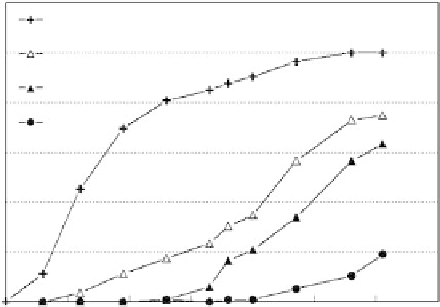Agriculture Reference
In-Depth Information
Check
a
100
Ecotex
LDPE
b
80
LDPE
Ecotex
c
60
40
d
20
0
70
80
90
100
Days after planting
110
120
130
140
Figure 10.3
Control of crown and root rot of tomatoes by solarization using various mulches. LDPE:
low-density polyethylene sheets; Ectorex: black sprayable polymer; double mulch: transparent LDPE,
over Ecotex mulch. Different letters denote signifi cant differences among treatments (
P <
0.05).
mulch, effective control of Fusarium crown and root rot of tomatoes (Figure 10.3) and
vine collapse of melons (caused by
M. cannonballus)
was achieved, while solarization
with regular fi lms was not effective (Arbel
et al.,
2003). The use of double mulch which
consists of a transparent fi lm over a black polymer coating is based on the same principle
as solar collectors for water heating in sunny countries. However, the cost of the double
mulching and the technology that needs to be developed for simultaneous tarping limit
the implementation of such an approach. Alternatively, this approach can be successfully
applied in strip solarization and small farm plots.
10.7.2
Improved fi lms
The use of new fi lms that intensify solar heating can offer an additional option for
improved control of soil-borne pathogens in various limiting crop-management systems.
Efforts were made to produce plastic fi lms which prevent heat loss through the fi lm
with infrared (IR) blocking material. Chase
et al.
(1999) observed improved heating using
IR fi lms under rainy and cloudy conditions in Florida, but other studies reported minor
or no differences in soil heating using IR fi lms. The use of IR fi lms was also studied by
Stevens
et al.
(1999).
Another successfully tested fi lm was a polyethylene fi lm which was formulated with
the addition of anti-drip (AD) components (Arbel
et al.,
2003). This formulation prevents
condensation of water droplets on the fi lm surface, leading to a 30% increase in irradia-
tion transmittance over regular fi lm. Soil temperatures under AD fi lm were 2-7
o
C higher
than under regular fi lm (Figure 10.4). Solarization with AD fi lm in fi eld experiments
resulted in effective control of sudden wilt of melons, while solarization with common
transparent fi lm had no effect on disease level (A. Gamliel, unpublished data). Virtually
impermeable fi lms were more effective in raising soil temperatures and killing
Fusarium
than regular polyethylene (Chellemi
et al.,
1997).


